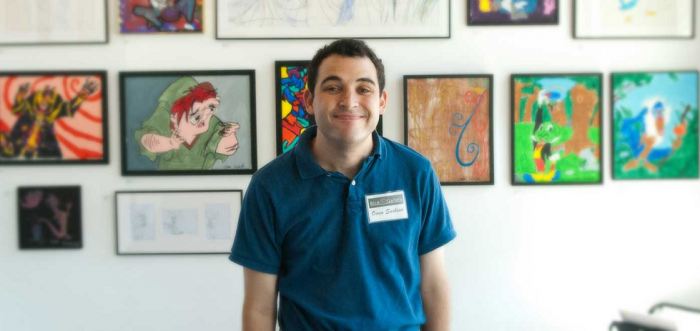
As someone whose early film obsessions consisted mostly of Disney films, Life, Animated, a documentary about a young man (Owen Suskind) who groks their themes and dialogue in order to wrangle with the world, held more than a passing interest for me. Learning that this was his family’s key to unlocking his regressive autism then raised several questions. Is there much of an overlap between animated cinema and neurodevelopmental therapy? Do squeaky-clean narratives like Disney’s set Owen up with unrealistic expectations of American life? How differently is he affected in that regard than your average expo-attending fanatic? Does he like any of those dodgy direct-to-video sequels? It’s pretty clear about 15 minutes in that director Roger Ross Williams is taking no Gibney-esque tack, and is satisfied just with showing Owen’s post-college steps into adulthood as emotively as possible. Uncomplicated as those goals may be, he fulfils them respectfully.
The best moments in Owen’s journey come in the first half, where his rough road to stability is recounted in interviews with him, his voluble father Ron (who wrote the book on which this is based,1 so just as well), his mother Cornelia, and brother Walter (no comment made on him sharing the original Disney’s first name, oddly). These are enhanced with the Suskinds’ home videos, a series of fluidly animated interludes by Parisian studio Mac Guff, and clips from the likes of Peter Pan and Aladdin intercut with Owen charmingly recreating them for the camera. All involved are capable storytellers in their own right, making each breakthrough in repairing Owen’s ability to communicate quite involving.
Unfortunately, the engrossment building up in this stretch tapers off in the second half. You can almost hear Williams pulling out the stops to get Life, Animated to a decent runtime, though this may not have been the case if he were more confident to stray from tear-jerking territory. Instead, he labours over a development involving Owen’s relationship with a girl, and while he touches on the question of whether he has unrealistic expectations here—Walter muses to camera on how to teach his 23 year-old brother about sex: “Disney porn?”—he and editor David Teague retreat to clips of Disney characters crying and cuts from his day-to-day that show he’s OK regardless. It’s good to know that, of course, but the manner in which it’s presented is too pat of a resolution.
The animated sequences also transition into recreating a story written by Owen, where he casts his child self as a protector of Disney sidekicks from darkness. He finds solace in those characters that help the hero, be it the downtrodden lackey or the mischievous comic relief, and with this role firmly established, he has a better sense of how to help others and himself. This would gesture towards the psychological and cultural significances of these films, and there are scenes showing Owen hold court in a classroom discussion about their moral instruction, reading aloud scenes from the movie as though literally acting out the popular Shakespeare comparisons of Lion King et al. Again, Williams pulls away from anything too trenchant in favour of sweeping, inspirational climax wherein he gives a defiant speech at a conference in France.2
There’s a pattern here: a remarkable journey to mental stability, formally bound by near-sighted vision. It’s almost like Williams and company have taken the safe wholesomeness of Owen’s beloved Mouse-terpieces as their own thematic compass, even with Owen having to adjust to independent adult life, and with the M83-sounding power-pop score by Todd Griffin and Dylan Stark straining for contemporary edge. Say what you will about the newer films from the studio,3 but they have at least tried to chart territory beyond the romantic and wish-fulfilling tenets of old. As basically satisfying as Life, Animated is, it feels too rooted in that simple past to be anything more.
